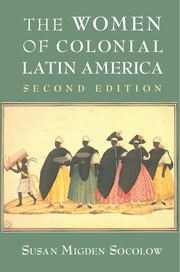Book contents
- Frontmatter
- Dedication
- Contents
- List of Figures
- Acknowledgments
- Introduction: Why Women?
- Chapter One Iberian Women in the Old World and the New
- Chapter Two Before Columbus: Women in Indigenous America and Africa
- Chapter Three Conquest and Colonization
- Chapter Four The Arrival of Iberian Women
- Chapter Five Women, Marriage, and Family
- Chapter Six Elite Women
- Chapter Seven The Brides of Christ and Other Religious Women
- Chapter Eight Women and Work
- Chapter Nine Women and Slavery
- Chapter Ten Women and Social Deviance
- Chapter Eleven Women and Enlightenment Reform
- Conclusion
- Documents
- Suggested Further Reading
- Index
- Plate section
- References
Chapter Five - Women, Marriage, and Family
Published online by Cambridge University Press: 05 February 2015
- Frontmatter
- Dedication
- Contents
- List of Figures
- Acknowledgments
- Introduction: Why Women?
- Chapter One Iberian Women in the Old World and the New
- Chapter Two Before Columbus: Women in Indigenous America and Africa
- Chapter Three Conquest and Colonization
- Chapter Four The Arrival of Iberian Women
- Chapter Five Women, Marriage, and Family
- Chapter Six Elite Women
- Chapter Seven The Brides of Christ and Other Religious Women
- Chapter Eight Women and Work
- Chapter Nine Women and Slavery
- Chapter Ten Women and Social Deviance
- Chapter Eleven Women and Enlightenment Reform
- Conclusion
- Documents
- Suggested Further Reading
- Index
- Plate section
- References
Summary
“Mother, what is marriage about?”
“My child, it is spinning, bearing children, and crying.”
The centrality of the family – the nuclear family and the extended kin group – to social organization was a Mediterranean cultural value that the Spanish and Portuguese transplanted to America. This importance of family meant that marriage, the institution that created new families, was viewed by church and state as crucial to an orderly social organization in the colonies. Furthermore, marriage protected females and delineated the boundary between those children who were legitimate (and therefore had legal claim against the family’s property) and those who were not. Although throughout colonial Latin America, legitimate marriage coexisted with other more informal relationships, marriage and the legitimacy it bestowed were marks of status, the indication that one was a person of rank rather than a mere plebeian, a Spaniard rather than a mixed-blood.
As a result, in colonial Latin America marriage was closely tied to race, social status, and economic conditions. Indeed, legal marriage was only overwhelmingly practiced by two socio-racial groups, groups that paradoxically occupied widely separated positions on the social scale. One group with a strong tendency to marry was the white elite (here we can include those who aspired to its ranks). The other group comprised Indians living in rural communities. As we shall see, through marriage these groups were responding to very different types of social pressures.
- Type
- Chapter
- Information
- The Women of Colonial Latin America , pp. 66 - 83Publisher: Cambridge University PressPrint publication year: 2015

